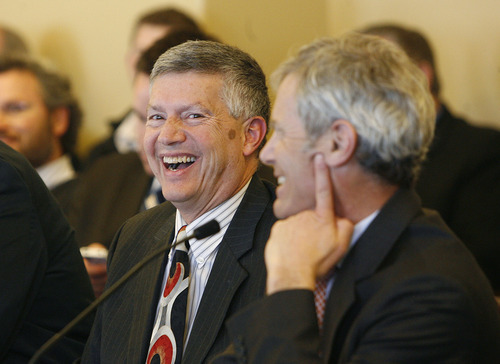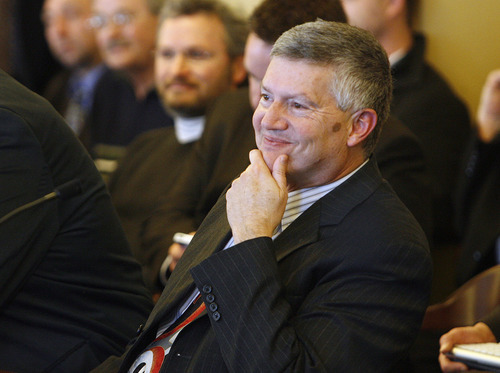This is an archived article that was published on sltrib.com in 2012, and information in the article may be outdated. It is provided only for personal research purposes and may not be reprinted.
A Republican lawmaker attempting to thwart Salt Lake City's anti-idling ordinance told a House committee Monday he would go back and work on his proposed bill after a 90 minute hearing left lawmakers unable to move it forward.
Rep. Wayne Harper, R-West Jordan, told the House Business and Labor Committee that HB104 was a way to stop the city's ordinance, which he said was anti-business and put a strain on local police charged with enforcing the measure.
But his bill had an added complication that Rep. Todd Kiser, R-Sandy, was struggling with — the addition in the bill that sought to eliminate Salt Lake City's requirement that taxicabs and limousine companies replace vehicles with more than 350,000 miles on them or are more than seven years old in an attempt to reduce pollution.
Kiser suggested Harper separate the bills, but Harper said he'd go back and work with city officials on the proposal.
"We will be back with it this session," he said.
The bill brought Salt Lake City Mayor Ralph Becker to testify against it — saying the state was attempting to trample a local government's rights to do what its citizens want. He said Salt Lake City has a different mindset than other parts of the state and a city should be allowed to regulate based on the population's wishes.
"As a local government, we certainly recognize and accept we are subject to the laws of the state," Becker said. "We value our relationship. We also hope the state will respect our differences."
The anti-idling ordinance was passed unanimously by the Salt Lake City Council in October and it would levy fines upwards of $100 against violators after several warnings had been issued. But Becker said the ordinance was never intended to generate revenue.
Instead, Cherise Udell, founder and president of Utah Moms for Clean Air, said it was a way to put teeth into a law that was similar to the anti-littering campaigns that sprang up in the '70s. She said with fines and public education, it is rare to see people toss trash out of their moving vehicles anymore.
"Over time, people got educated on the issue," Udell said. "I see the idling law in the same spirit."
Harper's bill also was met with support from cab companies that complained the city's requirement to replace older vehicles was burdensome on the business.
Mark Hatch of Yellow Cab said cars are already more fuel efficient than they were when the company started 35 years ago and that the fleet is continually evolving with cars that pollute less — making the ordinance unnecessary.
Twitter: @davemontero





